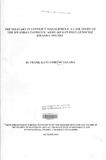| dc.contributor.author | Rusagara, Frank Kanyambo | |
| dc.date.accessioned | 2013-05-03T09:50:28Z | |
| dc.date.available | 2013-05-03T09:50:28Z | |
| dc.date.issued | 2003 | |
| dc.identifier.citation | Thesis presented in partial fulfilment of the requirement for the award of the degree of master of arts at the institute of diplomacy and international studies, University of Nairobi | en |
| dc.identifier.uri | http://erepository.uonbi.ac.ke:8080/xmlui/handle/123456789/18627 | |
| dc.description.abstract | The military has often been ignored in the study and practice of conflict management. This study aims to vindicate its role in conflict management. The study will illustrate that being rooted in the society in pre-colonial Rwanda, the military (/ngabo z' u Rwanda) served the national interest. The RPF/A recaptured the spirit of the Ingabo z' uRwanda through the concept of Rwandanicity in a concerted effort to fight against the negative perception of the role of the army as a guarantor of sectarian, as opposed to national interest. The RPF/A leadership saw the military as an institution that could be used to facilitate reconciliation and social stabilisation. The military's role in reconstruction and conflict management processes in post-genocide Rwanda have not been adequately recognised. Hence the need to examine and analyse the RPF/A's role in conflict management, and its motivating factors. | en |
| dc.language.iso | en | en |
| dc.title | The military in conflict management: a case study of the Rwandan patriotic army (rpa) in post-genocide Rwanda 1994-2002. | en |
| dc.type | Thesis | en |
| local.publisher | Institute of Diplomacy and International Studies | en |

